Hezbollah secretary-general set game rules once more: Israeli media
An Israeli correspondent says that "instead of taking advantage of the preemptive strike, [Israeli Prime Minister Benjamin] Netanyahu ordered the retreat of the aircraft."
-

Residents check the damage caused by a rocket fired from Lebanon in the occupied Palestinian coastal town of Akka on August 25, 2024. (AFP)
Israelis had expected their military to cross the border to Lebanon and "complete the mission after nearly a year of living like ducks in a shooting range" but were instead surprised by what they called the "theatricality of the preemptive operation" against Hezbollah, said Yair Kraus, Yedioth Ahronoth's correspondent in northern occupied Palestine.
"We, the residents, were pawns in the hands of the government and the army against Hezbollah," he said.
"Inside the sealed shelter, with no air conditioning and lights out due to rockets hitting power lines, I heard massive explosions outside from an intercepting missile just a few streets away from my home in Akka," he added.
He reassured everyone that "everything would change from now on. I knew the next few days would be tough, but that’s not what happened," Kraus indicated.
The correspondent said that "a few hours later, the directive came, pulling the rug out from under us once again... the [Israeli] attack was halted."
Hezbollah Secretary-General Sayyed Hassan Nasrallah, according to Kraus, "set the rules of the game once more," after launching over 340 rockets and an unspecified number of drones.
He criticized that "instead of taking advantage of the preemptive strike, [Israeli Prime Minister Benjamin] Netanyahu ordered the retreat of the aircraft."
Kraus argued that "a government that doesn’t aim for victory and doesn’t effectively work to return the displaced residents of the north to their homes and eliminate the threat hanging over nearly 300,000 people" should step aside.
"You deceived us, ministers and generals, with false slogans and empty promises," he concluded.
Hezbollah confirmed on Sunday that it launched an "initial response" to the assassination of Commander Martyr Fouad Shokor by launching a large number of drones deep into the occupied Palestinian territories.
The Islamic Resistance in Lebanon clarified that the attack targeted a strategic Israeli military site.
Later, Hezbollah Secretary-General Sayyed Hassan Nasrallah announced that the primary targets of Sunday's operation were the central Glilot base of Israeli military intelligence Aman, incorporating the central hub of Unit 8200, located near Tel Aviv, and the Ein Shemer airbase.
In the wake of its military strikes in the first phase of its retaliation to the Israeli aggression on #Beirut on July 30, Hezbollah said that it successfully launched all its attack drones at the designated times from their respective launch sites.
— Al Mayadeen English (@MayadeenEnglish) August 25, 2024
Exclusive sources told… pic.twitter.com/gxoED8KPxV
He confirmed that "a significant number of drones hit their intended targets, but the enemy is keeping all relevant details concealed."
Sayyed Nasrallah explained that the operation entailed two phases. The initial phase was focused on targeting sites and barracks in northern occupied Palestine with the hundreds of intended rockets to exhaust and deplete the Iron Dome and interceptor missiles, which paved the way for phase two, which saw the swarms of drones heading toward their intended targets.
Israeli officials point to Israeli failure in face of Hezbollah
A number of Israeli officials have voiced criticism against the Israeli government following Hezbollah's retaliation against the assassination of senior Hezbollah Commander martyr Fouad Shokor.
Israeli media reported that the Israeli government has faced internal disputes after Hezbollah launched rocket salvos and swarms of drones in Operation Arbaeen.
According to the Israeli Channel 12, the Likud party, led by Prime Minister Benjamin Netanyahu, is also experiencing internal disagreements.
In light of the situation, Netanyahu instructed his ministers and party members to refrain from making public statements.
Hanokh Milbitzky, a member of the Knesset's Foreign Affairs and Security Committee from the Likud, stated, "Israel has failed; the residents of the North are unprotected."
Gideon Saar, head of the New Hope party, echoed the criticism, stating, "Israel's enemies are determining the timing and intensity of the escalation. Not us."
Meanwhile, Moshe Tur-Paz, deputy speaker of the Knesset from the Yesh Atid party, remarked that the government's claims of a "preemptive strike on Lebanon" are just another form of stagnation.
On his part, the head of the Metulla settlement's local council, David Azulai, underlined that the Israeli government was abandoning its settlers in the North. The unfolding situation, he said, was a mere "war for the protection of Tel Aviv."
Read more: 'Israel' wasted $120mln on 'preemptive attack' against Hezbollah

 4 Min Read
4 Min Read








